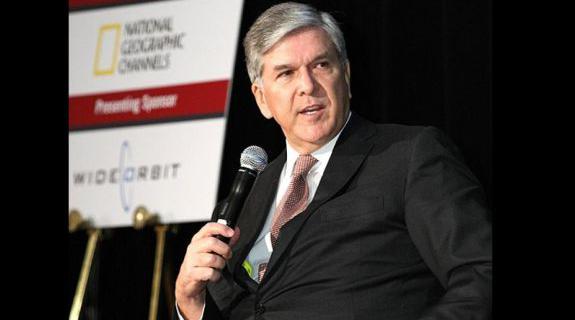NAB President Gordon Smith, who will be inducted into the Broadcasting & Cable Hall of Fame this fall, used his opening keynote at the annual confab to tout the continue power and relevance of the broadcast medium.
“When we talk about broadcasting, it’s very easy to talk about change – both in the way consumers access content and the way broadcasters are delivering it,” he said. “But there are some things technology will never change: Listeners and viewers will always want that local connection that broadcasters provide – with the weatherman who tells them if a storm is approaching, or with their favorite DJ who warns them of the traffic building up ahead. The highest-quality content will always find its way to broadcast TV because of its unparalleled reach.”
In this age of cord-cutting, broadcast networks are increasingly becoming the only services to offer coverage of the entire country. Many cable networks are losing distribution, and are only reaching coverage of up to 75 percent of the U.S., making them less valuable to national advertisers.
“Even in this era of unprecedented competition for eyeballs, broadcast TV airs 90 of the top 100 most-watched television shows every week,” Smith pointed out.
Smith noted that in the FCC’s recent spectrum auction “TV stations turned down $38 billion … choosing to keep their channels, compared to speculators and wireless companies that paid $19 billion for a portion of the TV band. I think we now know what the highest and best use of spectrum is.”
But he also encouraged broadcasters to continue to seek out and adopt new technologies, such as 4K high definition and the upcoming ATSC 3.0 broadcast standard, which he referred to as Next Gen TV and will offer more interactivity and other features for broadcast going forward.
As broadcasters work to keep up with rapidly developing changes both in technology and the way viewers are consuming media, they also need to stay true to their principals, Smith said.
These include “providing a lifeline during emergencies and keeping our communities safe, r aising awareness of important health and social issues that impact our lives, providing good jobs and essential information that come from advertising and contribute to our local and national economies and, defending our democratic ideals, the right to speak freely without fear of incrimination, and the right of the press to challenge the government and root out corruption in high places, public or private.”
READ MORE: Broadcasting and Cable
[Image of Gordon Smith courtesy of Broadcasting and Cable]
Tags:












































__twocolumncontent.jpg)











